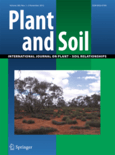
PLANT AND SOIL
Scope & Guideline
Innovating research to enhance crop productivity and ecosystem balance.
Introduction
Aims and Scopes
- Plant-Soil Interactions:
Research that explores how plants influence soil properties and vice versa, including studies on root exudates, microbial communities, and nutrient cycling. - Soil Health and Fertility:
Studies aimed at understanding the factors that contribute to soil fertility, including organic amendments, fertilization strategies, and soil management practices. - Ecological Restoration and Conservation:
Research that focuses on the restoration of degraded ecosystems, examining the role of plant-soil interactions in promoting biodiversity and ecosystem services. - Nutrient Dynamics and Management:
Investigations into nutrient cycles, particularly nitrogen and phosphorus, exploring their availability and uptake by plants, and the effects of fertilization on soil and plant health. - Climate Change Impacts:
Studies assessing the effects of climate change on plant-soil interactions, including how altered precipitation patterns and temperatures influence soil microbial communities and nutrient dynamics. - Phytoremediation and Soil Contamination:
Research on the use of plants for the remediation of contaminated soils, focusing on metal uptake, microbial interactions, and soil health restoration.
Trending and Emerging
- Sustainable Agriculture Practices:
Research exploring innovative agricultural practices that enhance soil health and reduce environmental impact, including cover cropping, reduced tillage, and organic amendments. - Soil Microbiome Research:
An increased focus on the role of soil microbiomes in nutrient cycling, plant health, and ecosystem functioning, highlighting the importance of microbial communities in plant-soil interactions. - Climate Resilience Strategies:
Studies aimed at developing strategies for enhancing crop resilience to climate change, focusing on plant-soil interactions under varying environmental conditions. - Advanced Biotechnological Applications:
The integration of biotechnology in agriculture, including the use of microbial inoculants and genetic engineering to improve plant performance and soil health. - Ecological Impacts of Invasive Species:
Research examining the effects of invasive plant species on native soil and plant communities, with a focus on their ecological consequences and management strategies. - Quantitative Modeling of Plant-Soil Systems:
The use of advanced modeling techniques to simulate plant-soil interactions and predict ecosystem responses to changes in management practices and environmental conditions.
Declining or Waning
- Traditional Soil Fertility Studies:
Research that solely focuses on chemical soil fertility without considering biological and ecological interactions is becoming less prominent as the field moves towards a more integrated understanding of soil health. - Basic Plant Physiology:
Studies centered primarily on basic physiological processes in plants, without a direct link to soil interactions, are being overshadowed by research that integrates physiological responses with soil and microbial factors. - Single-Species Studies:
Research focusing on individual plant species without considering community dynamics and interactions is less common, as the emphasis shifts towards understanding complex ecosystems and interactions. - Effects of Conventional Agriculture:
While still relevant, there is a noticeable decline in studies that critique conventional agricultural practices without proposing innovative alternatives, as the field increasingly seeks sustainable solutions.
Similar Journals
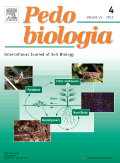
PEDOBIOLOGIA
Innovating Research for a Sustainable Soil FuturePEDOBIOLOGIA, published by Elsevier GmbH, is a prestigious journal dedicated to advancing the fields of Ecology and Soil Science. Renowned for its authoritative contributions to understanding soil biology and its ecological implications, PEDOBIOLOGIA has maintained a strong impact within the academic community, evidenced by its Q2 ranking in both Ecology, Evolution, Behavior and Systematics and Soil Science categories in 2023. The journal has a broad scope that encompasses fundamental and applied research on the interactions between soil organisms and their environment. Since its inception in 1977, it has provided vital insights into the biological functions of soil, serving as a crucial resource for researchers, professionals, and students alike. Although not an Open Access journal, its publications are accessible through various academic libraries, ensuring that cutting-edge research continues to be available to a global audience. Located in the vibrant academic hub of Munich, Germany, PEDOBIOLOGIA not only emphasizes the importance of soil ecosystems but also fosters interdisciplinary dialogue, making it an essential platform for innovative studies in the field.
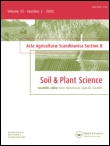
ACTA AGRICULTURAE SCANDINAVICA SECTION B-SOIL AND PLANT SCIENCE
Nurturing Innovation in Soil and Plant Research for Global ImpactACTA AGRICULTURAE SCANDINAVICA SECTION B-SOIL AND PLANT SCIENCE, published by Taylor & Francis AS, is a distinguished journal dedicated to the fields of Agronomy, Crop Science, and Soil Science. With an impressive impact factor, and categorized in Q2 for both Agronomy and Crop Science and Soil Science as of 2023, this journal is an essential resource for researchers, professionals, and students aiming to advance their understanding of soil-plant interactions and sustainable agricultural practices. Operating since 1992 and continuing through to 2024, ACTA aims to publish high-quality, peer-reviewed research that encourages the applicability of advanced scientific knowledge in real-world agricultural settings. While the journal is not open access, it remains widely accessible through institutional subscriptions, reflecting its commitment to disseminating essential findings and fostering innovation in soil and plant science worldwide. Nestled in the vibrant academic environment of Norway, ACTA AGRICULTURAE SCANDINAVICA serves as a key platform for nurturing groundbreaking research that informs sustainable agricultural policies and practices globally.
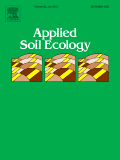
APPLIED SOIL ECOLOGY
Exploring the Depths of Soil ScienceApplied Soil Ecology, published by Elsevier, is a premier journal dedicated to advancing the field of soil ecology through rigorous research and innovative methodologies. With an impressive impact factor and a consistent placement in the Q1 quartile across various categories including Agricultural and Biological Sciences, Ecology, and Soil Science, this journal underscores its significance in the scientific community. The journal's scope encompasses critical areas such as soil biology, microbial ecology, and the role of soils in ecosystem services, aiming to foster collaboration and knowledge exchange among researchers, professionals, and students. The convergence of research efforts from 1994 to 2024 highlights its commitment to maintaining current and relevant discourse within the field. While open access options are not available, the quality and depth of the articles published ensure that the latest findings and discussions are accessible through institutional subscriptions. With a strong focus on empirical studies and applied research, Applied Soil Ecology is an essential resource for anyone interested in the complexities of soil ecosystems and their impact on the environment.
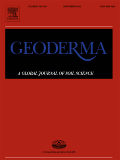
Geoderma
Unveiling the Secrets Beneath Our FeetGeoderma is a leading academic journal published by ELSEVIER, focused on the vital field of Soil Science. With an impressive impact factor and ranking as Q1 in its category for 2023, this journal stands as a prominent platform for researchers and professionals seeking to explore advanced scientific studies related to soil and its relationships with the ecosystem. Covering a wide range of topics from soil formation and characterization to land use and management practices, Geoderma is recognized for its rigorous peer-review process and is highly regarded within the global scientific community, as evidenced by its ranking of #12 out of 159 in the Scopus categories of Agricultural and Biological Sciences and Soil Science, placing it in the top 92nd percentile. With its inception dating back to 1967, the journal continually adapts and converges its content to meet the evolving demands of soil research until 2024 and beyond, providing invaluable insights for students, professionals, and researchers alike.
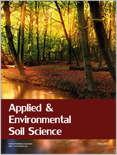
Applied and Environmental Soil Science
Pioneering research at the intersection of soil science and ecology.Applied and Environmental Soil Science, an esteemed journal published by HINDAWI LTD, focuses on disseminating high-quality research in the fields of soil science and environmental applications. With an ISSN of 1687-7667 and an E-ISSN of 1687-7675, this open-access journal has been a vital resource for the academic community since its inception in 2009. As of 2023, it holds a commendable position in the Q2 category for both Earth-Surface Processes and Soil Science, highlighting its impact in these crucial disciplines. The journal’s rankings further affirm its significance within the field, being placed 61st in Earth and Planetary Sciences and 58th in Agricultural and Biological Sciences. Researchers and practitioners alike benefit from the collaborative platform it offers for sharing innovative studies essential for sustainable soil management and environmental integrity. With a focus on advancing knowledge and fostering interdisciplinary dialogue, Applied and Environmental Soil Science stands as a crucial pillar for scholars and professionals dedicated to addressing the pressing challenges of soil and environmental health.

INDIAN JOURNAL OF AGRICULTURAL SCIENCES
Fostering collaboration for sustainable agricultural practices.Welcome to the Indian Journal of Agricultural Sciences, a vital resource for researchers and professionals in the field of agricultural sciences, published by the esteemed Indian Council of Agricultural Research. Established in 1974, this journal aims to disseminate high-quality research and developments in agronomy and crop science, facilitating knowledge exchange and advancement within the agricultural community. Though currently classified in the Q4 category according to 2023 data, it provides an essential platform for publication, contributing valuable insights towards sustainable agricultural practices. With an ISSN of 0019-5022 and an E-ISSN of 2394-3319, the journal houses important research that spans decades of convergence and collaboration, promoting innovation in agriculture across India and beyond. As an open access platform, it invites contributions that reflect a wide array of agricultural disciplines to foster sustainable food systems that address the challenges of food security. Join the network of scholars and practitioners by sharing your research and engaging with the profound work being done in this transformative field.
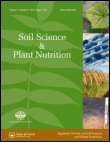
SOIL SCIENCE AND PLANT NUTRITION
Empowering researchers to enrich our agricultural future.SOIL SCIENCE AND PLANT NUTRITION, published by Taylor & Francis Ltd, stands as a prominent journal in the fields of plant science and soil science, with its impact reflected in its Q2 ranking across both categories in 2023. Established in 1955, this journal provides a vital platform for researchers, professionals, and students dedicated to understanding the complex interactions between soil and plant nutrition, with an emphasis on advancing sustainable agricultural practices. With an impressive Scopus ranking, placing it in the 75th percentile for Plant Science and the 71st for Soil Science, it attracts high-quality, peer-reviewed articles that contribute significantly to the body of knowledge in these disciplines. While the journal does not currently offer Open Access options, its comprehensive scope encompasses studies from fundamental research to applied science, making it an essential resource for anyone engaged in soil management, agronomy, or related fields.

Soil Research
Empowering the next generation of soil scientists.Soil Research, published by CSIRO PUBLISHING, is an esteemed scholarly journal dedicated to advancing the field of soil science, environmental science, and earth-surface processes. With an ISSN of 1838-675X and E-ISSN of 1838-6768, this journal serves as a vital platform for researchers and professionals to disseminate innovative findings and engage with contemporary challenges in soil and environmental management. The journal is recognized for its impactful contributions, as evidenced by its Q2 ranking in 2023 across multiple categories including Earth-Surface Processes, Environmental Science, and Soil Science, reflecting its influence and relevance in these critical academic areas. Operating from its headquarters in Clayton, Victoria, Australia, Soil Research is committed to fostering open access to research, ensuring wider dissemination of knowledge. As it converges toward its future objectives until 2024, the journal aims to provide a forum for diverse perspectives that enhance understanding and stewardship of soil resources, making it an indispensable resource for students, researchers, and industry professionals alike.
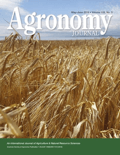
AGRONOMY JOURNAL
Advancing Sustainable Agriculture Through Innovative ResearchThe Agronomy Journal, published by Wiley, is a leading platform for cutting-edge research in the field of agronomy and crop science. Established in the United States, this prestigious journal carries the ISSN 0002-1962 and E-ISSN 1435-0645, with its coverage spanning from 1976 to 2024, showcasing a wealth of knowledge over decades. The journal is recognized in the top quartile (Q1) of its category, making it a highly respected source for quality literature, ranking #108 out of 406 in the Scopus database and reflecting a 73rd percentile standing in agricultural and biological sciences. While it operates under traditional access options, its commitment to disseminating valuable scientific inquiry aligns with the objectives of advancing sustainable agricultural practices globally. The Agronomy Journal serves as an indispensable resource for researchers, professionals, and students eager to stay abreast of significant advancements and discussions influencing the future of crop science and agronomic research.
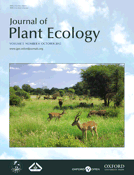
Journal of Plant Ecology
Cultivating Knowledge for Environmental StewardshipJournal of Plant Ecology, published by Oxford University Press, is a premier journal dedicated to advancing the scientific understanding of plant ecology. With an ISSN of 1752-9921 and an E-ISSN of 1752-993X, this journal has established itself as a leading resource in the field, maintaining a prestigious Q1 ranking across multiple categories in the 2023 Scopus rankings, including Ecology, Evolution, Behavior and Systematics and Plant Science. The journal's commitment to high-quality research is underscored by its influence in agricultural and biological sciences, reflected in its competitive percentiles. While currently not offering open access, its comprehensive scope spans various ecological issues critical to understanding plant interactions and ecosystems, making it an essential read for researchers, educators, and students alike. The Journal of Plant Ecology not only facilitates the dissemination of vital findings but also fosters collaboration within the global scientific community. Discover more about the latest innovative research and key developments in plant ecology, and contribute to the dialogue that shapes our understanding of environmental stewardship and biodiversity conservation.